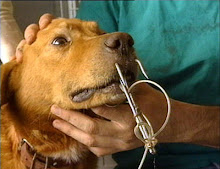Homeopathy is a therapy that is very popular amongst dog owners. It's non invasive, ccompletely natural and there are no side effects.
This particular therapy has been used in people since 1796, when it was discovered by the German scientist, Samuel Hahnemann. At around the same time, Hahnemann was also using homeopathy in animals so it has been an option for our dogs for as long as it has been an option for people.
How does homeopathy work in our dogs? Those who practice homeopathy believe that illness is caused by any disturbance in the life force of the body. This means that a disease firstly affects the energy levels, then appears as a symptom. So, if you're going to treat a disease, you can't just treat the symptoms, you have to resolve the problems at the body's energy level.
Homeopathy involves giving a patient a very small dose of the substance responsible for causing a disease, which then cures the symptoms. You'll have heard of the expression "like cures like". Creation of a homeopathic remedy takes into account all aspects of a dog's health, including their emotional state of mind. Because each dog is different, even if they have the same symptoms, each remedy is specific to that dog.
Homeopathic remedies are created by diluting plant and animal substances, and even synthetic materials, many times in water or alcohol. They are shaken vigorously between dilutions. By the time the dilutions are finished, the shaking has activated the energy of the ingredients. This energy helps your dog's body to heal itself.
Dogs are often treated with homeopathy for bruises, difficulty birthing pups, and bites and stings. It's also been found to be very helpful in the case of emotional distress such as fear of storms or separation anxiety. This is because the remedy works on your dog's energy levels.
Some people don't believe that homeopathy works. However, many veterinarians are now studying homeopathy, and can offer it to you either as an alternative, or in conjunction with conventional treatments. Vets can complete a continuing education course in homeopathy, and can then be recognized as a Certified Veterinary Homeopathist.
If you'd like to try this treatment on your dog, ask your vet for a referral to another vet who can treat your dog with homeopathy. If he doesn't know anyone who can help, check the website for the Academy of Veterinary Homeopathy at www.theavh.org and you should find a veterinarian who can help.
Homeopathy is safe, non toxic and you can use it to treat your dog and have no concerns about any adverse side effects. It is an option you may wish to include in your pet health toolbox.
This guest post is brought to you by Electric Dog Fence DIY's staff
veterinarian Dr. Susan Wright.
Dog Fence DIY takes you through all the steps of using an electric fence for dogs including installation, training, and how to find the best systems. We offer a wide range of pet containment systems at the best available prices.
Monday, October 5, 2009
Subscribe to:
Post Comments (Atom)




1 comment:
I love the technological advances in dog fences. I like to know exactly where my dog is at all times, so I wanted a system that would let me know if he breached the perimeter. I just came across new Radial-Shape Wireless Dog Fence from Havahart Wireless, which took an existing technology that was used for tracking machines in hospitals and used it for tracking dogs.
Here's how it works:
http://www.havahartwireless.com/electric-dog-fence/how-it-works/the-science-behind
Post a Comment